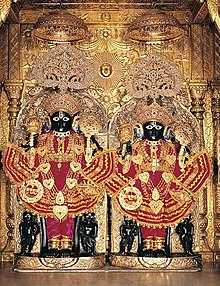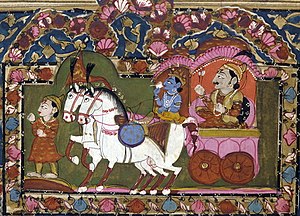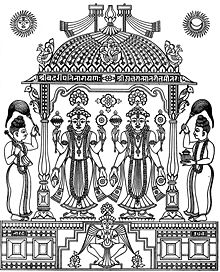


Page
of
1


| Nara Narayana | |
|---|---|
 The twin form of NarNarayan Dev at theSwaminarayan Temple Ahmedabad | |
| Devanagari | - |
| Sanskrit Transliteration | nara-nryaa |
| Affiliation | Avatar of Vishnu |
| Abode | Badrinath |
Nara-Narayana (Sanskrit: -; nara-nryaa) is a Hindu deity pair. Nara-Narayana is the twin-brother incarnation of the Supreme GodVishnu on earth, working for the preservation of dharma or righteousness. In the concept of Nara-Narayana, the human soul Nara is the eternal companion of the Divine Narayana.
The Hindu epic Mahabharata identifies God Krishna with Narayana and Arjuna - the chief hero of the epic - with Nara. The legend of Nara-Narayana is also told in the scripture Bhagavata Purana. Hindus believe that the pair dwells at Badrinath, where their most important temple stands.
Members of the Swaminarayan Hinduism sect believe that the events that took place at Badarikashram, the abode of Nara- Narayana, led to the incarnation of Swaminarayan.

The name "Nara-Narayana" can be broken into two Sanskrit terms, nara and Narayana. Nara means human, and Narayana refers to the deity of the name.
Monier-Williams dictionary says Nara is "the primeval Man or eternal Spirit pervading the universe (always associated with Narayana, "son of the primeval man"; both are considered either as gods or sages and accordingly called , , . In epic poetry, they are the sons of dharma by Murti or Ahimsa and emanations of Vishnu, Arjuna being identified with Nara, and Krishna with Narayana.- Mahabharata, Harivamsa and Purana".[1]Narayana is Vishnu while Nara is Shesha
Nara-Narayana are depicted jointly or separately in images. When depicted separately, Nara is portrayed with two hands and wearing deer skin while Narayana is shown on the right in the usual form of Vishnu.
Sometimes, both of them are depicted identical to each other. They are depicted four-armed holding a mace, a discus, a conch and a lotus, resembling Vishnu.

Arjuna and Krishna are often referred to as Nara-Narayana in the Mahabharata and are considered part incarnations of Nara and Narayana respectively, according to the Bhagavata Purana.[2]
In a previous life, the duo were born as the sages Nara and Narayana, and who performed great penances at the holy spot of Badrinath. Nara and Narayana were the Fifth Avatar of Lord Vishnu. The twins were sons of dharma, the son of Brahma and his wife Murti (Daughter Of Daksha) or Ahimsa.[3] They live at Badrika performing severe austerities and meditation for the welfare of the world. These two inseparable sages took avatars on earth for the welfare of mankind and to punish the wicked ones. The sages defeated a demon calledSahasrakavacha ("one with a thousand armours"). In Mahabharata Sahasrakavacha was reincarnated as Karna, born with Kavacha and Kundals (armour and earings)and Krishna and Arjun were reincarnated as Nara and Narayana [4] Legend has it that once Lord Shiva tried to bring the fame of Nara and Narayana before the entire world. To do that, he hurled his own potent weapon Paashupathastra at the meditating rishis. The power of their meditation was so intense that the astra lost its power before them. Lord Shiva stated that this happened since the duo were jnanis of the first order constantly in the state of Nirvikalpa Samadhi.
The Bhagavata Purana tells the story of the birth of Urvashi from the sages Nara-Narayana.[5] Once, sages Nara-Narayana were meditating in the holy shrine of Badrinath situated in the Himalayas. Their penances and austerities alarmed the gods, so Indra, the King of Devas, sent Kamadeva, Vasanta (spring) and apsaras (nymphs) to inspire them with passion and disturb their devotions. The sage Narayana took a flower and placed it on his thigh. Immediately there sprung from it a beautiful nymph whose charms far excelled those of the celestial nymphs, and made them return to heaven filled with shame and vexation. Narayana sent this nymph to Indra with them, and from her having been produced from the thigh (uru in Sanskrit) of the sage, she was called Urvashi.[6][7]

According to the Bhagavata purana, "There in Badrikashram (Badrinath) the Personality of Godhead (Vishnu), in his incarnation as the sages Nara and Narayana, had been undergoing great penance since time immemorial for the welfare of all living entities." (3.4.22)
In Badrinath temple's sanctorium, to the far right side of the stone image of Badri-Vishala (or Badri-Narayana), are the images of Nara and Narayana. Also, the Nara and Narayana peaks tower over Badrinath.

According to Bhandarkar, the gods Nara-Narayana must be very famous at the time of the composition of the Mahabharata, since in the opening stanzas of different books obeisance is made to these two gods. In Vanaparvan (12. 46, 47), Krishna says to Arjuna,"O invincible one, you are Nara and I am Hari Narayana, and we, the sages Nara-Narayana, have come to this world at the proper time.." In the same Parva, chapter 30 (verse 1); Shiva says to Arjuna "In former birth you were Nara and with Narayana as your companion, performed austerities for thousands of years at Badari".[8]
In the Swaminarayan sect, Nara and Narayana, called as Nara-Narayana Deva. They are believed to reside at Badrikashram and to be the prime controllers of the destiny of all beings, depending on their karma. Nara-Narayana Deva are believed to have manifested at Narayana Ghat on the banks of river Sabarmati at Ahmedabad. Therefore their images were installed by Swaminarayan at the first Swaminarayan temple, Shri Swaminarayan Mandir, Ahmedabad (India).
It was events that took place at Badarikashram, the abode of Nara Narayana, that led to the incarnation of Swaminarayan. It is believed that Narayana took birth as Swaminarayan due to a curse of sage Durvasa which he accepted at his own will. The curse led to Narayana taking the form of an avatar on Earth to destroy evil and establish ekantik-dharma, religion based on morality, knowledge, detachment and devotion.[9] Important Hindu scripturessuch as the Bhagavad Gita and Bhagavata Purana confirm that Narayana descends in human form to destroy evil, in the form of Swaminarayan. The Visvaksena Samhita, 11th part of the Brahma Purana, as well as the Skanda Purana give a direct reference to Narayana taking birth in the form of Swaminarayan
'Hearing these words uttered by the high-souled Kesava, all the persons who sat in that assembly remained silent, their hair standing on their ends. And all the kings thought within themselves that there was no man who could dare reply to that speech. And seeing that all the kings sat silent, Jamadagni's son (addressing Duryodhana) then said these words in that assembly of Kurus, 'Listen confidingly to my words illustrated by an example, and seek thy own good if my speech recommends itself to thee. There was a king of yore named Dambhodbhava, who was the Head of the earth. It hath been heard by us that his sovereigntyextended over the whole world. And that mighty car-warrior, rising every morning after the night had passed away, called the Brahmanas and the Kshatriyas unto himself and asked them, saying, 'Be he a Sudra, a Vaisya, a Kshatriya, or a Brahmana, is there any one who is superior or even equal to me in battle?' And uttering these words that king wandered over the earth, intoxicated with pride and thinking of nothing else. And it so happened that certain Brahmanas endued with high souls, conversant with the Vedas, and fearing nothing on earth, counselled the monarch, repeatedly boasting of his prowess, to curb his pride. But though forbidden by those Brahmanas to boast in that way, the king continued to ask the Brahmanas as before the same question day after day. And some high-souled Brahmanas then, endued with ascetic merit and acquainted with the proofs furnished by the Vedas, were inflamed with anger, and addressing that proud and
p. 200
boastful king intoxicated with prosperity, told him, 'There are two persons who are foremost of all men and who are always victorious in battle. Thou, O king, wilt by no means be equal to them if thou seekest an encounter with any one of them.' And thus addressed by them, the king asked those Brahmanas, saying, 'Where may those two heroes be found? In what race are they born? What feats have they achieved? And who are they? And the Brahmanas answered him, saying, It had been heard by us that those two persons are ascetics called Nara and Narayana. They have both taken their births in the race of man. Go and fight with them, O king. It is that illustrious pair, Nara and Narayana, who are now practising the severest of penances in some hidden region of the mountains of Gandhamadana.' Hearing those words of the Brahmanas, that king speedily mustered his large army consisting of six kinds of forces, 1 and unable to bear their reputation, marched to the spot where those unvanquished ascetics were, and arrived at the rugged and frightful mountains of Gandhamadana. He began to search after those Rishis, and at last, came upon them concealed within the woods. And beholding those two best of persons emaciated with hunger and thirst, their veins swollen and visible, and themselves much afflicted with cold winds, and the hot rays of the sun, he approached them, and touching their feet, enquired after their welfare. And the two Rishis received the king hospitably, with fruits and roots, and a seat and water. And they then enquired after the king's business, saying, 'Let it be done.' And thus addressed by them, the king said unto them the same words that he was in the habit of saying unto all. And he said, 'The whole earth has been conquered by the might of my arms. All my foes have been slain. Desiring a battle with you both I have come to this mountain. Offer me this hospitality. I have been cherishing this wish from a long time.' Thus addressed, Nara and Narayana said, 'O best of kings, wrath and covetousness have no place in this retreat. How can a battle, therefore, be possible here? There are no weapons here, and nothing of unrighteousness and malice. Seek battle elsewhere. There are many Kshatriyas on earth.'
"Rama continued, 'Although thus addressed, the king still pressed them for giving him battle. The Rishis, however, continually soothed him and overlooked his importunity. King Dambhodbhava, still desirous of battle, repeatedly summoned those Rishis to fight. Nara, then, O Bharata, taking up a handful of grass-blades, said, 'Desirous of battle as thou art, come, O Kshatriya, and fight! Take up all thy arms, and array thy troops. I will curb thy eagerness for battle hereafter!' Dambhodbhava then said, If, O ascetic, thou thinkest this weapon of thine fit to be used against us, I shall fight with thee though thou mayest use that weapon, for I have come hither desirous of fighting.' Saying this,
p. 201
[paragraph continues] Dambhodbhava with all his troops, desirous of slaying that ascetic, covered all sides with a shower of arrows. That ascetic, however, by means of those blades of grass, baffled all those terrible shafts of the king that were capable of mangling the bodies of hostile warriors. The invincible Rishi then let off towards the king his own terrible weapon made of grass-blades and which was incapable of being counteracted. And highly wonderful was that which happened, for that ascetic, incapable of missing his aim, pierced and cut off, by those grass-blades alone, the eyes and ears and noses of the hostile warriors, aided also by his power of illusion. And beholding the entire welkin whitened by those grass-blades, the king fell at the feet of the Rishi and said, 'Let me be blessed! Ever inclined to grant protection unto those that sought it, Nara then, O king, said unto that monarch, 'Be obedient to the Brahmanas and be virtuous. Never do so again. O king, O tiger among monarchs, a conqueror of hostile towns, a Kshatriya mindful of the duties of his own or, should never, within even his heart, be as thou art. Filled with pride, never insult anybody on any occasion, be inferior or superior to thee. Even such conduct would befit thee. Acquiring wisdom, abandoning covetousness and pride, controlling thy soul, restraining thy passions, practising forgiveness and humility, and becoming amiable, O king, go, and cherish thy subjects. Without ascertaining the strength and weakness of men, never insult any one under any circumstances. Blessed be thou, and with our leave, go hence, and never again behave in this way. At our command, enquire thou always of the Brahmanas as to what is for thy good! The king then, worshipping the feet of those two illustrious Rishis, returned to his city, and from that time began to practise righteousness. Great indeed, was that feat achieved of old by Nara. Narayana, again, became superior to Nara in consequence of many more qualities. Therefore, O king, besides such weapons as Kakudika, Suka, Naka, Akshisantarjana, Santana, Nartana, Ghora, andAsyamodaka, are placed on the string of that best of bows called Gandiva, go thou unto Dhananjaya, laying aside thy pride Struck with these weapons, men always yield up their lives. Indeed, these weapons have other means corresponding with the eight passions, such as lust, wrath, covetousness, vanity, insolence, pride, malice, and selfishness. Struck with them, men are confounded, and move about frantically deprived of their senses. Under their influence, persons always sleep heavily, cut capers, vomit, pass urine and excreta, weep, and laugh incessantly. Indeed, that Arjuna is irresistible in fight, who hath for his friend Narayana--the Creator and Lord of all the worlds--fully acquainted with the course of everything. Who is there in the three worlds, O Bharata, who would venture to vanquish that hero--the Ape-bannered Jishnu--who hath no equal in battle? Countless are the virtues that reside in Partha. Janardana again, is superior to him. Thou art thyself well-acquainted with Dhananjaya, the son of Kunti. They that were Nara and Narayana in days of yore are now Arjuna and Kesava. Know
p. 202
then, O great king, who those brave and foremost of persons are. If thou believest in this and dost not mistrust me adopt thou a virtuous resolution and make peace with the sons of Pandu. If thou regardest this as thy good, viz., that there should be no disunion in thy family, then make peace, O foremost of Bharata's race, and do not set thy heart upon battle. O thou, that are foremost of Kuru's line, the race to which thou belongest is highly regarded on earth. Let that regard continue to be paid to it. Blessed be thou, think of what conduces to thy own welfare.'"
^^^^...Surya...you forgot the most important part of the story.
While returning from the devadasi's house late one night, (Nalayani was carrying her husband in a basket on her head- he could not walk due to his deformed, leprosy afflicted body) Rishi Mudgalya's foot accidently touched Indra's body who was perched on a tree.Angered, Indra pronounced a curse on the riashi saying that he will die when daybreak comes.Nalayani heard the curse calmly. Rishi Maudgalya asked whether she was not worried about his impending death.Nalayani replied in measured toned "Indra said you will die when daybreak comes...but I say, the daybreak will never come"Summoning all her powers of satitva, Nalayani declared that the next day will not dawn at all...it will be forever night.Ten nights thus passed. Because of Nalayani's powers of chastity, the sun could not rise at all.As is usual in such stories, all the gods rushed to her and begged her to allow the sun to rise. INdra too removed his curse.Rishi Mudgalya pleased with her assumes a beautiful body and the two enjoy several years of conjugal bliss. At length however, the rishi wanted returned to his austerities.But Nalayani was adamant and kept saying "Patim dehi...patim dehi " five times.An angered rishi Mudgalaya cursed her that in her next life she will have five husbands. So saying he left her- and then- a shocked Nalayani entered fire.
comment:
p_commentcount